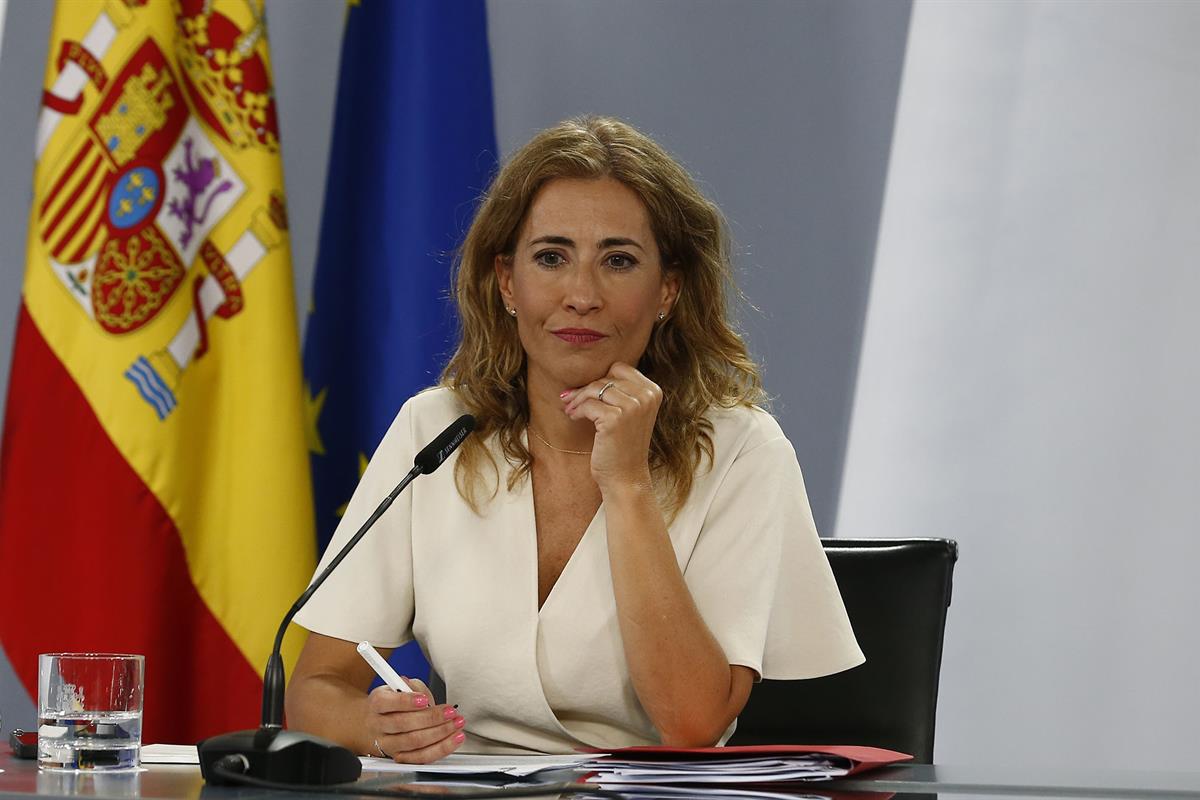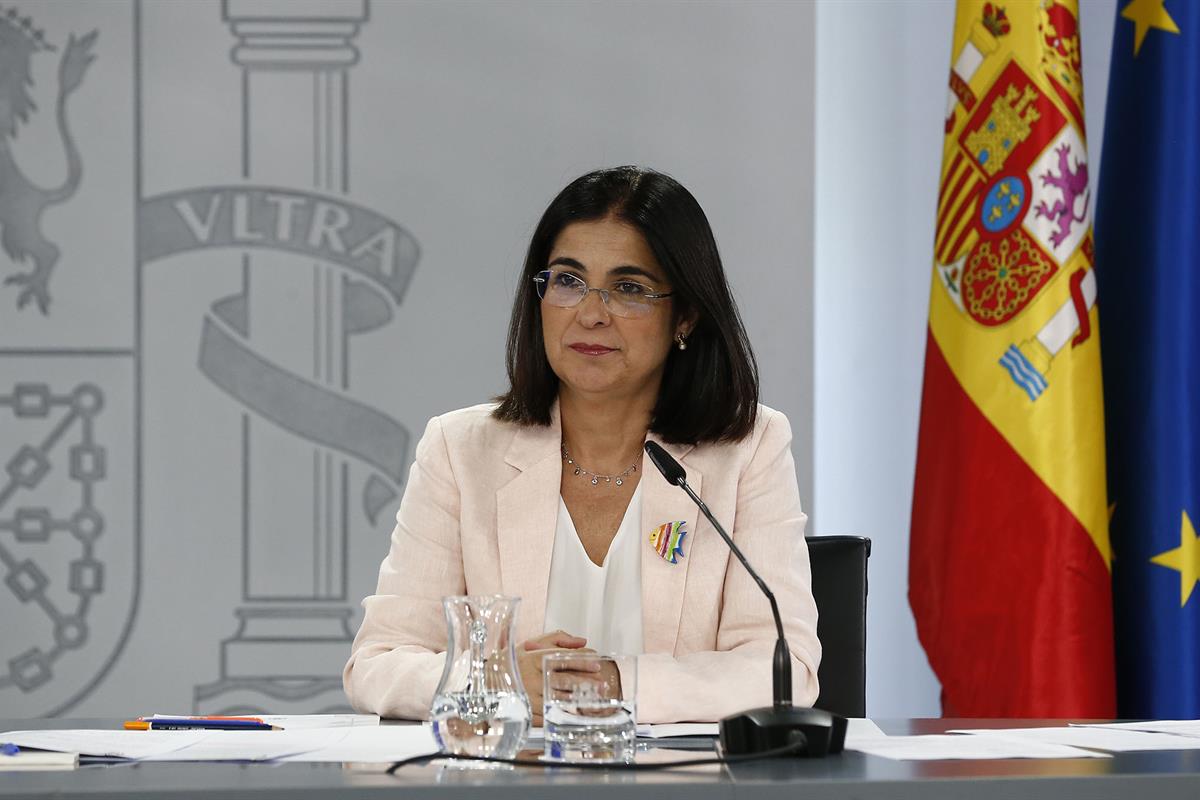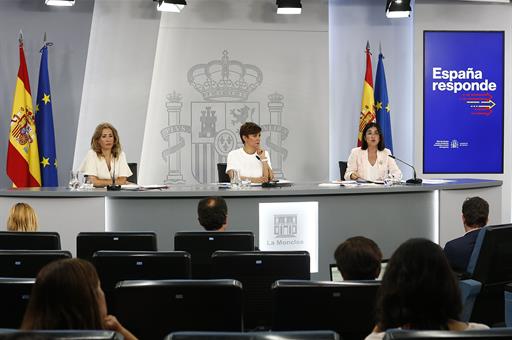The Government of Spain approves aid to alleviate the damage caused by this summer's forest fires
Council of Ministers - 2022.8.23
Moncloa Palace, Madrid
The Council of Ministers has agreed to declare as areas seriously affected by civil protection emergencies territories of all the communities, with the exception of Cantabria and Asturias and the autonomous cities of Ceuta and Melilla, as a result of the 120 forest fires they have suffered since 12 June, as announced yesterday by the President of the Government of Spain, Pedro Sánchez.
The Minister for Territorial Policy and Government Spokesperson, Isabel Rodríguez, has expressed her regret that three people have died and has detailed that 27,500 others have been evacuated from their homes. She also pointed out that these fires have different characteristics to those known so far due to the effects of climate change and the high temperatures recorded this summer.
In this regard, the spokesperson pointed out that last year just over 50,000 hectares were burnt, while this year more than 200,000 hectares have already been burnt. The fires have caused serious damage to infrastructure and public and private property, as well as to crops and farms, industrial estates and other productive facilities, of an extent that is as yet unquantified .
Isabel Rodríguez reported that this state aid complements the actions entrusted to the regional and town administrations, and that the government has activated the mechanisms to reduce the deadlines for their management and allocation.
The agreement adopted today includes direct aid to be implemented by the Ministry of Home Affairs, as well as other measures ordered by other ministries, including tax benefits, employment and social security initiatives and aid to local authorities to repair municipal facilities and equipment.
Residential rehabilitation and social housing
 Pool Moncloa/Ricardo Galán
Pool Moncloa/Ricardo Galán
The Government of Spain has authorised the distribution of 1.9 billion euros from the European Funds among the regional governments and the cities of Ceuta and Melilla to finance residential refurbishment and the construction of social rental housing in energy-efficient buildings.
The Minister for Transport, Mobility and the Urban Agenda, Raquel Sánchez, pointed out that the subsidies are included in the Plan for Recovery, Transformation and Resilience, whose main pillar is to transform the economy, make it sustainable and tackle climate change, and which is now also helping to alleviate the consequences of Russia's aggression against Ukraine.
According to the minister, this aid will contribute "decisively" to boosting the construction sector, which was one of the worst affected during the COVID-19 pandemic. "The granting of these funds will facilitate the creation of around 180,000 jobs for the self-employed and for small and medium-sized enterprises, which are mainly involved in carrying out this type of energy and comfort rehabilitation work in homes," he said.
Raquel Sánchez added that this "far-reaching action" by the government aims to achieve savings of 30% in household consumption and to improve their well-being. Measures envisaged include replacing windows in houses and providing them with a heating system powered by renewable energies.
The minister specified that the subsidies approved today are in addition to the transfers of 3.54 billion euros already made in this area and represent "the implementation of 75% of the resources planned for rehabilitation and 100% of those planned for the promotion of social rental housing".
Sánchez predicted that "we will be able to reduce our annual non-renewable primary energy consumption by around 3000 GW hours per year and we will be able to expand the public rental housing stock in energy efficient buildings by 20,000 by the end of 2026", thanks to the funds from the recovery plan.
The minister concluded that the scope of this aid programme is "enormous" for citizens, for employability, and in the determined fight against climate change.
First step towards the creation of the State Public Health Agency
 Pool Moncloa/Ricardo Galán
Pool Moncloa/Ricardo Galán
The Council of Ministers has approved the draft bill for the creation of the State Agency for Public Health (AESAP), in compliance with the provision contained in the 2011 General Public Health Act and the measures contained in the Opinion of the Commission for Social and Economic Reconstruction of the Lower House of Parliament, which was formed during the COVID-19 pandemic.
The Minister for Health, Carolina Darias, has recognised that "there has undoubtedly been a before and an after of the experience of the pandemic" and that, for this reason, this state centre has become a priority for the government and a necessity for the country: "It will allow us to be better prepared in terms of anticipation, management, coordination, analysis and response to threats and risks to the health of the population".
The Agency, Darias continued, is organised as an institution of technical and scientific excellence that will serve to reinforce the capabilities of the National Health System, "a fundamental element of well-being in our country".
Coordination with the health authorities of the regional governments and cities, European institutions, international organisations and scientific and academic societies will also be essential.
Prevention, monitoring, warning and response
Darias pointed out that the creation of the new centre will be a "decisive" step towards tackling the current context of climate change and its effects on health, new zoonoses and emerging diseases.
The Agency's main areas of work will be disease prevention and control. The current National Epidemiological Surveillance Network, whose work is tracking and monitoring communicable or infectious diseases, will be transformed into the State Public Health Surveillance Network and will then also cover non-communicable diseases with high morbidity or mortality, such as chronic diseases, cancer and diabetes.
The state centre will also develop early warning systems and draft preparedness and response plans for identified health risks and threats, as well as provide the necessary information for the public to raise awareness of them.
The Agency will be responsible for the monitoring and evaluation of the recently approved Public Health Strategy and will contribute to the design of policies in health and non-health settings, with the aim of reducing inequalities through a One Health approach.
Current Affairs
During their intervention at the press conference following the Council of Ministers, both Isabel Rodríguez and Raquel Sánchez reminded the audience that on 1 August the Executive approved a Royal Decree-Law on economic sustainability measures relating to scholarships and study grants, as well as energy saving and efficiency measures and measures to reduce energy dependence on natural gas, which will be submitted for validation next Thursday in the Lower House of Parliament. Both ministers urged parliamentary groups to support the initiative.
The spokeswoman recalled that the regulation complies with the agreements made with the European Union to offer a unanimous response to Putin's war and that this will be complemented by a contingency plan that is being drawn up by the government.
According to Rodríguez, some of the measures included in the Royal Decree-Law have led to a 9.5% reduction in energy consumption since it came into force. One million students who already receive grants will get an extra 100 euros per month. In addition, the transport sector, one of the sectors most affected by the rise in fuel prices, will receive 450 million euros in direct aid.
For her part, Raquel Sánchez pointed out that more than 300,000 people have registered on the RENFE website to purchase, as of tomorrow, the new free travel cards that can be used between 1 September and 31 December on local, commuter and medium-distance trains. "We are helping families, young people and workers to make it more affordable, or even free, to go to their workplace, health centre or place of study," she said.
Non official translation





